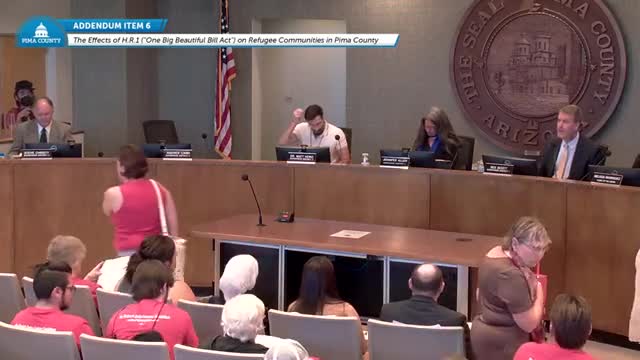County hears warnings that HR1 SNAP cuts will hit recently resettled refugees in Pima County starting Nov. 1
Get AI-powered insights, summaries, and transcripts
Subscribe
Summary
Refugee resettlement agencies and community members told the Board of Supervisors that provisions of HR1 will end SNAP eligibility for recently resettled refugees on Nov. 1 and could affect about 1,700 Pima County residents; the board urged county tracking and support for affected families.
Refugee resettlement agencies appearing at a time‑certain item told the Pima County Board of Supervisors that policy changes in HR1 — which took effect in July — will remove Supplemental Nutrition Assistance Program (SNAP) eligibility for newly resettled refugees and could cause an abrupt increase in food insecurity beginning Nov. 1.
Who spoke: Representatives from the International Rescue Committee (IRC), Lutheran Social Services of the Southwest and Catholic Community Services gave coordinated presentations about operational impacts in Pima County. Aaron Rippenkroger, director of IRC’s Tucson office, said the change mainly affects people who arrived through the U.S. Refugee Admissions Program and are still within their first year in the country but have not yet obtained lawful permanent resident status.
Key claims and numbers - Meheria Habibi of IRC said the state had verbally told agencies that the SNAP cuts would take effect Nov. 1 and estimated the change would affect approximately 1,700 individuals in Pima County. - Agencies reported that other benefits are at risk under HR1: Medicaid changes are expected in October 2026 and work‑requirement expansions for able‑bodied adults without dependents will broaden the age range to 14–64 for some SNAP eligibility rules. - Lutheran Social Services’ Amelia Smith described the resettlement process and how SNAP and initial supports allow families to stabilize, find employment and navigate medical and educational systems.
Why this matters: Presenters said the affected people are legally resettled refugees and lawful asylum recipients who are otherwise authorized to work and established in the community. Agencies said the changes were not directed at recent cross‑border arrivals but at people legally admitted through refugee or related programs. Speakers emphasized that SNAP in the first year is often essential for families to achieve economic self‑sufficiency.
Personal testimony: Sumaya Ahmed, a refugee from Somalia who resettled with her family, said SNAP helped her family survive during their first months and that sudden termination of benefits causes “stress and anxiety” and undermines parents’ ability to focus on work and school for their children.
Board response: Supervisors thanked agencies for the briefing and urged county staff to track impacts. Supervisor Matt Hines described the policy as “intentionally starving refugees and their children” and asked staff to pursue state and federal advocacy. Supervisor Andres Cano requested continued coordination and said the county must prepare for growing need given a Nov. 1 deadline.
Next steps: County leaders asked resettlement agencies for followup information and said the county would monitor state implementation choices. Agencies requested proactive county planning for food‑assistance gaps and said community groups and faith partners are mobilizing funds and programs to backfill benefits where possible.
Limitations: Presenters said state guidance was still being finalized and several implementation details were unresolved; the numbers cited (for example, the estimate of 1,700 people affected) were provided by agencies rather than the state in the meeting record.
Ending: The board heard a broad cross‑section of local service providers and refugees describe immediate needs if SNAP benefits end for newly resettled families, and it asked staff to track and report back on how the county can respond to the impending changes.
